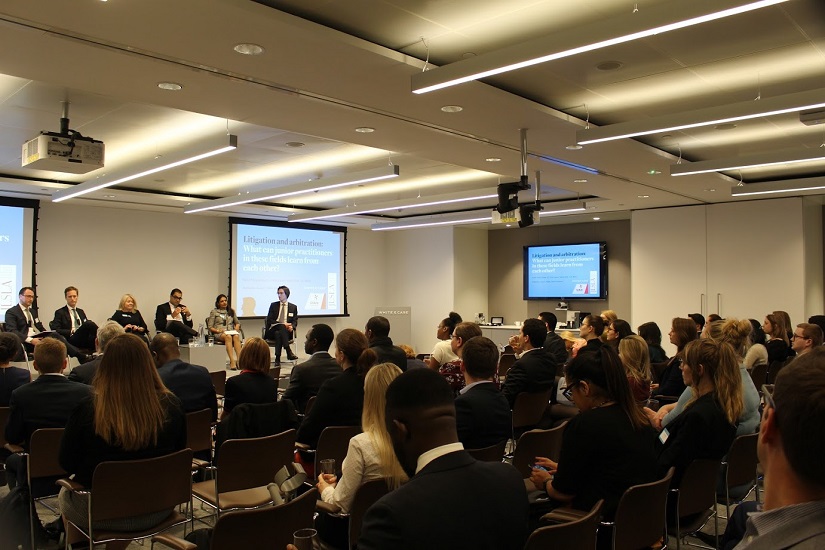CIArb News
YMG and JLSLA event “Litigation and Arbitration: What can junior practitioners in these fields learn from each other?”
25 Jun 2019
On 5 June 2019, the CIArb Young Members’ Group (YMG) and the Junior London Solicitors Litigation Association (JLSLA) came together at White & Case’s offices for a Q&A discussion on what junior practitioners in arbitration and litigation can learn from each other.
The speakers included Paula Hodges QC (Head of Global Arbitration at Herbert Smith Freehills LLP), Vivek Kapoor (Senior Associate at Stephenson Harwood LLP), Nehali Shah (Barrister at One Essex Court) and Tom Miles (In-house counsel at Shell). The discussion was moderated by Kieran Anderson (Associate at White & Case LLP and Junior LSLA committee member) and Ronan O'Reilly (Associate at White & Case LLP and Chair of the CIArb’s Young Members Group)
The seminar began with a discussion around the benefits and challenges of having a mixed arbitration and litigation practice. Vivek noted that there are numerous benefits and hardly any challenges. In his view, disputes is a black art rather than a strict science – the most important aspect is skill. Both require intellectual rigour - litigation brings discipline, arbitration a multijurisdictional perspective and ability to adapt. Tom pointed out that from the in-house lawyer’s perspective it is important for the law firms presenting their proposals for the case to show a solution-oriented attitude and listen to the clients’ expectations for the particular dispute. Nehali’s advice for young practitioners looking to build a mixed practice was to keep pressing to be exposed to both arbitration and litigation and not to worry if you don’t always have an even split.
The efficiency of proceedings was the next topic discussed. Vivek referred to the competition between litigation and arbitration as a driver for improvement in procedural efficiency. Tom emphasised that from the clients’ perspective, efficiency is the critical criterion when it comes to choosing a dispute resolution method – time equals money. He noted that there are positive efficiencies and negative efficiencies with both disciplines.

Subsequently, Kieran introduced the topic of confidentiality and asked whether the confidentiality of arbitration was hindering the development of common law. Paula reminded the audience that clients put a significant value on the fact that the arbitration process is confidential and it is unlikely that they would be willing to give up this convenient feature. Vivek noted that the main idea and purpose of arbitration is to resolve disputes, not to develop the law.
Ronan then introduced the topic of technology and innovation in dispute resolution. Vivek noted that technology is reconditioning the conduct of litigation and arbitration, which presents both opportunities and challenges. He emphasised that the inherent flexibility of arbitration provides more scope to introduce innovation. From the courts’ perspective, Nehali mentioned recent innovations such as The Financial Markets Test Case Scheme and Disclosure Pilot Scheme. She also praised the convenience and efficiency of using electronic bundles. In the context of innovation in arbitration, Paula highlighted the Pledge for Equal Representation in Arbitration (which now has 3500 signatories) as one of the most important recent innovations. Tom echoed Paula’s comments about the need for diversity and stated that Shell is a strong supporter and advocate for diversity.
Towards the end of the discussion, Kieran asked the panel for their predictions about the consequences of Brexit on London as seat of arbitration and the attractiveness of the English courts. The speakers agreed that while Brexit posed some threats, the strengths of London’s foundations would enable those challenges to be met in both arbitration and litigation. Nehali emphasised that the advantages of English jurisdiction (e.g. long history of English law, flexibility of the common law system, independence and excellence of the judiciary) would not be diminished by Brexit. Overall, the speakers were optimistic about the future of London as a centre of dispute resolution.
Photos from the event are available here.
12 Apr 2024
Significant progress on Advisory Centre for International Investment Law at UNCITRALIn 2017, UNCITRAL Working Group III (WGIII) was launched and was tasked with working on procedural reform of the investor state dispute settlement (ISDS) system. From 1-5 April 2024, Ciarb participated in the 48th session of WGIII in its capacity as an observer delegate.
12 Apr 2024
A promising future: Strengthening mediation through diversityWe speak to mediator and Imam Ibrahim Hussain MCIArb about mediation’s bright future, and why diversity strengthens mediation.
12 Apr 2024
RIDW24: Construction Arbitration Trends and Key TakeawaysCristen Bauer, Ciarb's Head of Policy, highlights a few key takeaways from the discussions at Riyadh International Disputes Week 24 (RIDW24)